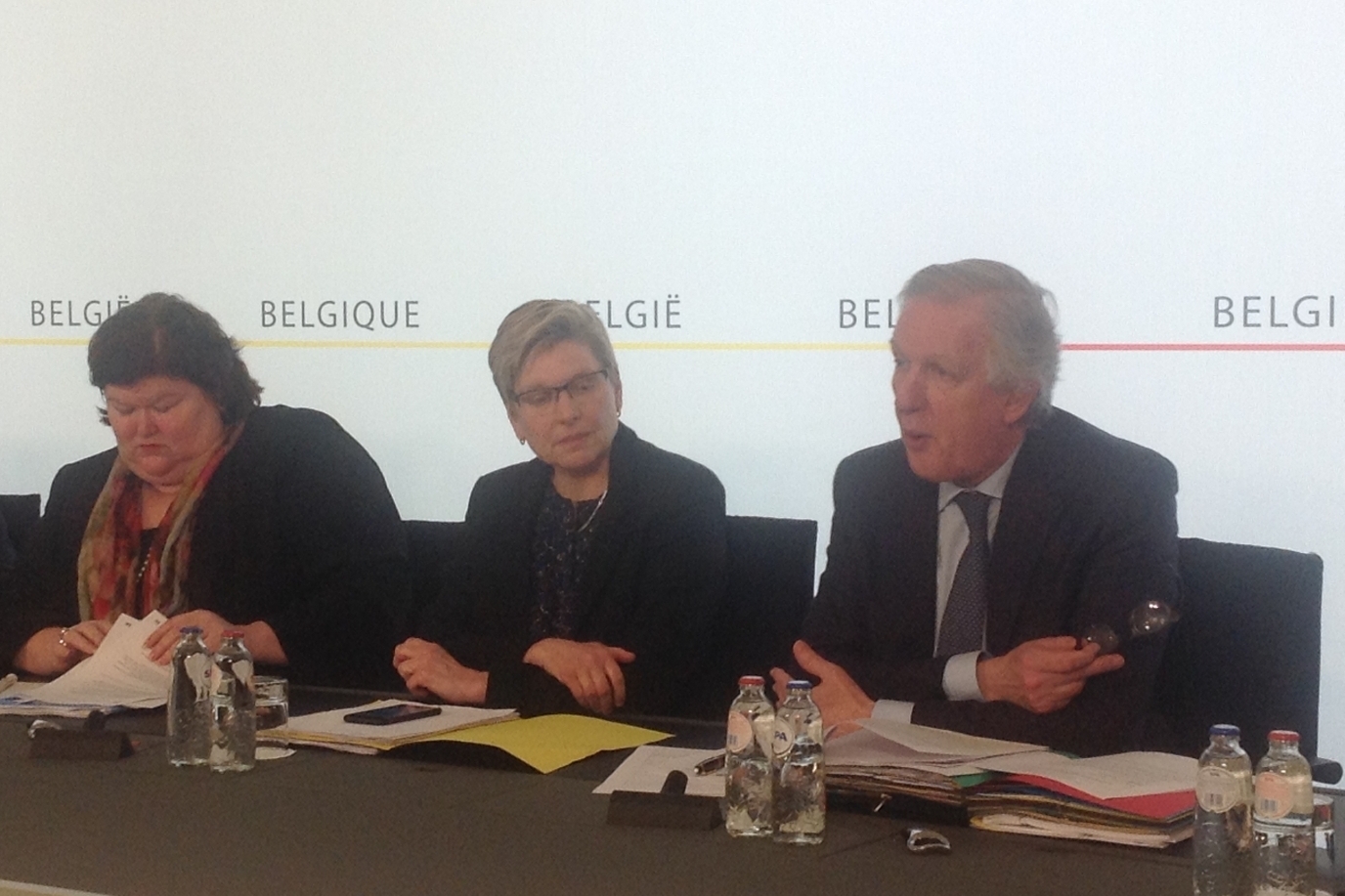Looking back on the 2015 pension reforms
In 2015 the structural reform of our pension system was initiated. Numerous measures from the coalition agreement have already been adopted by parliament and are beginning to bear fruit.

In 2015 the Minister for Pensions, Daniel BACQUELAINE, had numerous pension reforms adopted. Following steps in the context of social dialogue, serene parliamentary debates and without sterile controversy a great number of indispensable reforms were adopted. Most are aimed at increasing the average retirement age on the labour market, thereby guaranteeing the financial and social sustainability of our pension system. The extension of working life must contribute to guaranteeing our system of social protection and to increasing the average pension amounts.
For the purpose of bringing about fairness these reforms are also aimed at a gradual harmonization between the various pension schemes (employees, civil servants, self-employed persons).
In addition, Daniel BACQUELAINE has created new institutions aimed at strengthening social dialogue which needs to accompany additional structural reforms on the one hand and to bring together knowledge on pensions on the other.
These measures meet the recommendations from the European Commission and the OECD aimed at increasing the employment rate amongst older employees and at guaranteeing the financial sustainability of our pension system.
The last report drawn up by the Study Committee on Ageing emphasizes the indispensable nature of this reform. In addition to the fact that this reform – between 2014 and 2060 – will result in a decrease in the rise of the budgetary costs in connection with ageing by 1.9% of GDP, it will also permit a rise in the employment rate of persons between the ages of 55 and 66. The aforementioned employment rate should grow by 14.4% between 2014 and 2060.
Daniel BACQUELAINE : « In just over a year we have already changed the Belgian pension system to a great extent. »
Contact
Koen Peumans, spokesperson of Daniel Bacquelaine, Minister for Pensions
0473/81.11.06 - koen.peumans@bacquelaine.fed.be
Measures taken in 2015 :
Prolongation of careers and harmonization of the pension systems
Since 1st January 2015 the income from professional activities earned by pensioners after the age of 65 or following a career of 45 years are no longer subject to limitations. This measure contributes to increasing the employment rate of elderly employees and to enhancing people’s freedom of choice, insofar as their career and retirement planning is concerned.
As recommended by the Pension Reform Committee 2020-2040 the abolition of the diploma gratification - allocated for the purpose of early retirement – will bring about a gradual harmonization between the various retirement schemes of the career length conditions to be fulfilled in order to take up retirement.
It is important to stress that the reform will be accompanied by various transition measures which were negotiated within the framework of social dialogue, particularly to the benefit of those who are about to retire or those who have taken up or could have taken up pre-retirement leave.
Another important reform was adopted by parliament in July 2015. It concerns the reforms that increase the retirement age imposed by law and make the conditions to take up early retirement more stringent
The Act of 10th August 2015 increases the retirement age imposed by law to the age of 66 in 2025 and to the age of 67 in 2030, and this according to one of the scenario’s brought forward in the report drawn up by the Pension Reform Committee 2020-2040.
In this way, Belgium has joined the majority of European countries which had already increased the retirement age imposed by law or had planned to increase it (Denmark, Germany, Greece, Iceland, Italy, Norway, Poland, Slovakia, United Kingdom, Ireland and Spain). In addition, the Netherlands, which have set the retirement age imposed by law at 67, has linked it to the evolution of life expectancy.
Guaranteeing social sustainability
From the latest report drawn up by the Study Committee on Ageing it appears that the reforms adopted by this government will decrease the poverty rate amongst pensioners. The increase of the retirement age imposed by law and the tightening up of the conditions for early retirement – without altering the reference career – will permit employees to build up additional rights and in this way to receive higher pensions on average.
The report also stresses that the reforms will reduce inequality, since the lowest pensions will increase the most, thereby reducing the poverty risks amongst employees with an incomplete career, women in particular.
Moreover, the government – thanks to its decision to again pay out 100% of the welfare envelope – has brought about rising purchasing power amongst large numbers of pensioners, particular those with a small pension. In 2015 and 2016 nearly half a billion euros were spent on pension upgrades, being more than double the amount reserved for pensions in 2013-2014!
On 1st June 2015 the minimum pension of persons who had a mixed career as an employee and a freelancer was – insofar as the part worked as an employee is concerned – put on a par with the minimum pension of employees who had a complete career.
On 1st September 2015 new increases took place: the minimum pensions of employees and self-employed persons, the income guarantee for the elderly and the amounts paid as guaranteed income for the elderly were increased by 2%. The pensions which came into effect prior to 1995 rose by 1% and the pensions which came into effect prior to 2010 rose by 2%.
For a great number of years already an increase in the gross pension could for certain pensioners lead to a reduction of the net pension. In an attempt to close this tax trap, which hurt the pensioners having a small pension the most, tax assessments were revised and reduced. This taxation can still be eased by the abolition of the 30% tax bracket and the raising of the lower limit of the 45% tax bracket which were decided in the context of the « tax shift » the government has adopted.
Reinforcing social dialogue and bringing together knowledge on pensions
By the Act of 21st May 2015 Daniel BACQUELAINE has created three new institutions : The National Pension Committee, the Knowledge Centre and the Academic Council.
The National Pension Committee is a tripartite body composed of the representatives from employers and self-employed persons, representatives from public and private sector employees and representatives from the government. Its task is to determine for each pension scheme the outlines of various substantial pension reforms, such as the possibility to take up part-time retirement, the introduction of a points-based pension and the modernization of our pension system’s family dimension.
The Knowledge Centre, headed by a monitoring committee, is composed of the Directors-General of the pension institutions, the Federal Planning Bureau and the Government Ministers in charge of pensions and will give any and all necessary support required for the assessment and the correct implementation of pension-related propositions. The Academic Council, which is the successor to the Pension Reform Committee 2020-2040, will provide substantiated scientific advice on all pension-related propositions.
In addition, the Council of Ministers approved the Minister for Pensions’ draft bill creating the Federal Pension Service on 1st April 2016. This new body is the result of the merger between the National Pensions Office administering the pensions of employees and the Public Sector Pensions Office administering public sector pensions. This merger will permit both bodies to share their knowledge and know-how, thereby offering our citizens better service.
Occupational pensions, a long-awaited agreement
Insofar as occupational pensions are concerned, Daniel BACQUELAINE asked the social partners to resume their talks on the issue of guaranteed yield for which no agreement was reached under the previous government. Following various months of discussions, in which the Office of the Minister for Pensions was involved, the social partners reached an agreement in October 2015. The government has decided to implement this agreement in full, which again shows the importance the government attaches to social dialogue.
The agreement offers a balanced solution which is not limited to a revision of the scope of the yield guarantee, but also includes a great number of measures aimed at the further development of occupational pensions. It is of paramount importance to strengthen second pillar pensions and to make them accessible to as many employees as possible.


